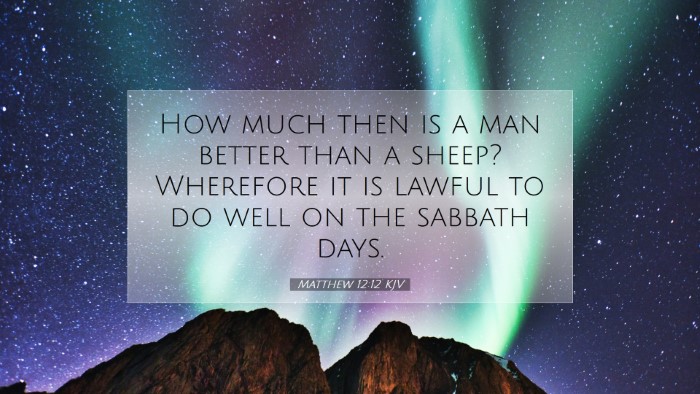Commentary on Matthew 12:12
Matthew 12:12 (KJV): “How much then is a man better than a sheep? Wherefore it is lawful to do well on the sabbath days.”
Introduction
This verse is situated within a passage where Jesus engages in a debate with the Pharisees regarding the observance of the Sabbath. The issue at hand is the distinction between the traditions of man and the true intent of God's Law. This commentary will explore the theological implications of the verse as articulated by renowned scholars such as Matthew Henry, Albert Barnes, and Adam Clarke.
Contextual Background
During this period, the Jewish leaders had developed numerous regulations concerning Sabbath observance, often overshadowing the spirit of the law. The primary debate revolves around Jesus healing a man with a withered hand on the Sabbath, presenting a powerful illustration of divine compassion over ritualistic adherence.
The Value of Humanity
Matthew Henry highlights the intrinsic value of human life, arguing that Jesus emphasizes that a man is considerably more important than a sheep. This elevates the worth of human beings in the Creator's eyes, reinforcing the idea that humanity, made in the image of God, holds a special status in His creation.
According to Henry, the question posed by Jesus is rhetorical, aimed at dismantling the rigid interpretations of the Pharisees. The implication is clear: if mercy can be extended to animals in distress on the Sabbath, how much more should it be granted to a fellow human being?
Sabbath and Doing Good
Albert Barnes notes that the phrase “it is lawful to do well on the sabbath days” serves as a rebuke to the Pharisees' legalistic interpretation of the Sabbath. He explains that the Sabbath was meant for rest but also for acts of kindness and mercy. Jesus did not dismiss the Sabbath's significance; rather, He redefined it in a manner that aligned with God's merciful character.
Furthermore, Barnes emphasizes that doing good cannot be confined by the rule of the Sabbath. The law's intent was never to create burdens but to bring rest and restoration, both spiritually and physically.
Legalism vs. Mercy
Adam Clarke discusses the ongoing struggle between law and grace, underscoring that the Pharisees' strictness often blinded them to the greater moral and ethical principles of the law itself. Clarke eloquently states that mercy supersedes sacrifices, echoing Jesus’ earlier teachings (e.g., Hosea 6:6).
Clarke reinforces that healing on the Sabbath highlighted God's compassion over human-made traditions. By citing examples from the Gospels where Jesus healed on the Sabbath, he illustrates that the divine priority is love and restoration, rather than rigid adherence to the law.
Theological Implications
The implications of Matthew 12:12 extend beyond legalistic practices to touch upon the broader themes of grace, mercy, and the purpose of divine law. Humanity's unique status as God's creation mandates that we prioritize love and compassion, aligning our actions with these divine attributes.
This verse challenges contemporary believers to evaluate how they interpret the law in light of Christ's teachings. The balance between observance and the spirit of the law continues to be relevant for ministers, students, and scholars today.
Conclusion
Matthew 12:12 serves as a profound reminder of the heart of God concerning His creation. As reflected in the insights of Henry, Barnes, and Clarke, the message is clear: while observing sacred traditions, the overarching principle is one of love, mercy, and compassion. As followers of Christ, may we strive to embody these values in our interactions, ensuring that we mirror the heart of God in all that we do, particularly when it concerns those who are in need.


